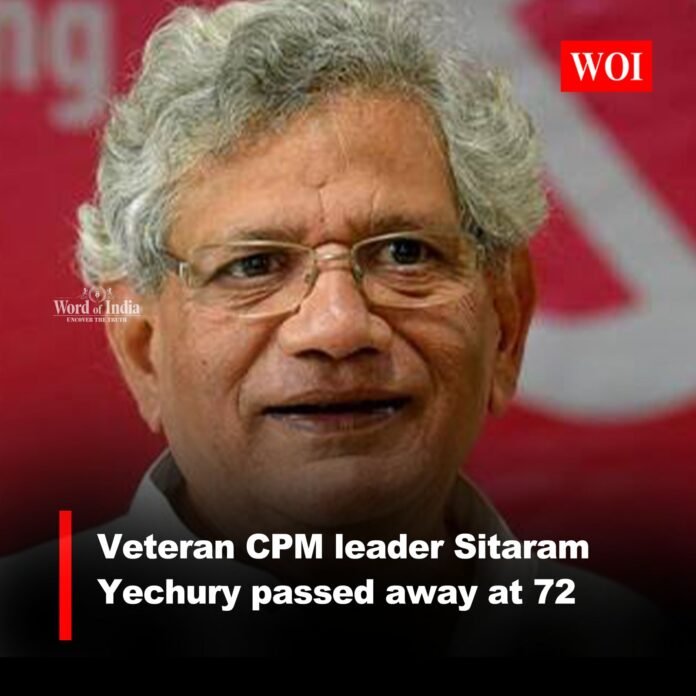By Shashank Pasupuleti
Sitaram Yechury Veteran Leader Passes at 72: A Key Figure in Indian Left-Wing Politics
September 12, 2024 – A Profound Loss for Indian Politics
Sitaram Yechury, the General Secretary of the Communist Party of India (Marxist) [CPI(M)], passed away at the age of 72 on September 12, 2024, after a prolonged illness. Yechury had been battling a severe pneumonia-like infection, which developed into an acute respiratory tract infection. Admitted to the All India Institute of Medical Sciences (AIIMS) in Delhi on August 19, Yechury’s condition worsened over time. Despite being placed on respiratory support, he passed away at 3:05 PM on September 12.
A Pillar of Left-Wing Politics
Yechury’s political journey began during his student days at Jawaharlal Nehru University (JNU), where he was a part of the Students’ Federation of India (SFI). He rose through the CPI(M)’s ranks and became General Secretary in 2015, leading the party through turbulent times. Yechury played a crucial role in shaping the opposition’s response to India’s political landscape, helping form the INDIA bloc as a coalition against the Bharatiya Janata Party (BJP).
Political Career: From JNU to National Leadership
Yechury’s political career is a testament to his lifelong dedication to Marxist ideology and his leadership within CPI(M).
➔ 1970s: Yechury became the President of the JNU Students’ Union in 1977, marking his entry into political leadership.
➔ 1980s: In 1984, he was inducted into the Central Committee of CPI(M).
➔ 1990s to 1992, Yechury was elected to the Politburo, the highest decision-making body within the party.
➔ 2005-2017: Yechury served two consecutive terms as a member of the Rajya Sabha, the Upper House of Parliament, where his speeches and debates gained wide recognition.
➔ 2015: He succeeded Prakash Karat as the General Secretary of CPI(M) and led the party through various national and state elections, positioning it as a critical voice in opposition politics.
A Family Rooted in Commitment to Social Causes
Yechury was married to Seema Chishti, a senior journalist. The couple had two sons, Ashish Yechury and Akhil Yechury. Sadly, Ashish passed away in 2021 due to COVID-19 complications, a deep personal loss for Yechury. Despite these tragedies, his commitment to social causes remained unwavering. In a final act of service, Yechury’s family decided to donate his body to AIIMS for medical research and teaching purposes.
Relationships Beyond Political Boundaries
Yechury was respected not only within the CPI(M) but also by political leaders across the ideological spectrum. His close friendship with Pranab Mukherjee, the former President of India, exemplified his ability to bridge divides. Despite differing political philosophies, Yechury and Mukherjee shared a mutual respect, working together on parliamentary committees and maintaining a personal bond outside of politics.
Yechury’s ties with leaders like Harkishan Singh Surjeet and Prakash Karat within the CPI(M) were also significant. Surjeet mentored Yechury, while Karat worked closely with him, even when they had differing approaches within the party.
Slogans and Ideals that Defined His Leadership
Yechury’s political rhetoric was steeped in the principles of Marxism and the struggles of the working class. Some of his frequently used slogans reflected his core beliefs:
– “People before Profits”: A strong statement against capitalist exploitation, emphasizing the need for policies that prioritize people’s welfare.
– “Defend Secularism”: Yechury was a vocal advocate for protecting India’s secularism, a central tenet of his political philosophy.
– “Strengthen Democracy”: He frequently called for safeguarding democratic institutions and processes from authoritarian tendencies.
– “Workers of the World, Unite!”: A classical Marxist call for solidarity, which Yechury often invoked in support of global workers’ movements.
A Legacy for Youth and Student Politics
Yechury’s journey from a student leader to a national figure offers valuable lessons for today’s youth:
➔ Commitment to Ideals: Yechury never wavered in his commitment to Marxism, despite global and national challenges. He consistently fought for the rights of the working class and social justice.
➔ Courage to Challenge: His ability to challenge powerful political forces while advocating for the marginalized showcases the need for bravery in politics.
➔ Intellectual Rigor: Known for his sharp intellect, Yechury demonstrated that politics requires a strong foundation in knowledge and theory.
➔ Building Alliances: His ability to build coalitions, even with parties he ideologically disagreed with, exemplified the need for pragmatic collaboration in politics.
Suggestions for Youth and Student Movements
➔ Engage with Real Issues: Like Yechury during his JNU days, youth should focus on issues affecting society, such as inequality and social justice.
➔ Develop Critical Thinking: Politics requires understanding both surface problems and systemic issues.
➔ Organize and Mobilize: Yechury’s role in SFI shows how collective action can drive change.
➔ Balance Ideals with Pragmatism: Yechury’s career shows the importance of staying true to ideals while adopting practical approaches when needed.
➔ Respect Diversity and Democracy: Upholding democratic values and embracing diversity are essential for building a more inclusive society.
A Life Dedicated to Social Justice
Sitaram Yechury’s passing marks the end of an era for Indian left-wing politics. His unwavering commitment to Marxist ideology, his intellect, and his ability to build cross-party relationships leaves a lasting legacy. As youth and future political leaders look ahead, Yechury’s life offers numerous lessons in leadership, integrity, and the pursuit of social justice.


